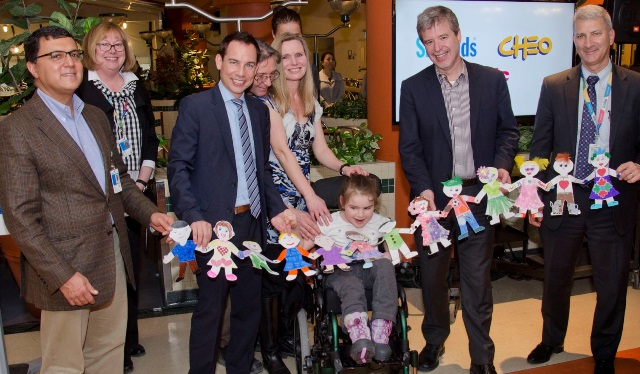
By Justin Faiola
Visiting a healthcare provider for an initial consultation can be a lengthy, cumbersome process. You have paperwork to fill out, you bring a list of medications you’re taking, and you have to tell them about your health history, which is often followed up with a number of questions.
But after that initial visit, you don’t have to go through that entire process again — you simply update any new information or validate existing information to ensure safe care. However, for Lisa Richardson and her husband Chris McHardy, whose seven-year-old daughter Kathleen is globally developmentally delayed, it often feels like every visit to one of Kathleen’s many providers is a “start-from-the-beginning” initial visit.
Kathleen has been a patient at The Hospital for Sick Children (SickKids) for six of the seven years of her life. “She sees many different specialists for various appointments when she visits the hospital, and also works with different providers such as physiotherapists and occupational therapists in the community,” explains Lisa.
Lisa says that working with multiple providers is challenging because the burden of keeping each of these individuals informed about what care Kathleen is receiving is often their family’s responsibility.
“Each time we visit one of Kathleen’s specialists we receive a piece of paper that contains some information about her visit – a test result, comments from her specialist – which we keep record of and bring to her next appointment to ensure our daughter’s care is accurately represented. We’ve been doing this for six years so we’ve become good at keeping everyone in the loop, but it’s still easy to miss something or overlook small details.”
Having an incomplete picture of the patient story can also be frustrating for clinicians who are fully aware of the impact this can have on clinical decisions and patient outcomes.
“The evolution of patient care, not only at SickKids, but throughout the entire health-care system, has become incredibly complex and fragmented,” says Dr. Michael Apkon, President and CEO of SickKids. “We need to work towards creating a more coordinated system to improve care across the province; a system where a child’s entire care team, including their family, can contribute their expertise and access their health information.”
To move in this direction, SickKids has begun a multi-year project to implement a fully integrated health information system using software from the company Epic, an industry leader in electronic health record software. In addition, SickKids and the Children’s Hospital of Eastern Ontario (CHEO) have partnered to develop and implement the first integrated Canadian paediatric instance of Epic.
The project will fundamentally change the way SickKids provides care and will improve research by bringing all patient information and charting into one integrated electronic system.
The Epic system also provides patients and their families with anytime access to their health information through an online portal called MyChart, a radical departure from the limited access many patients and families currently have.
To tackle this complex, transformative process, SickKids has assembled more than 100 project staff who will be dedicated to working on the project. In addition, hundreds of staff from across the hospital will work closely with the project team to shape the system into one that reflects the care delivered at SickKids.
“This investment we are making is not just an IT project,” explains Dr. Sarah Muttitt, Vice-President and Chief Information Officer at SickKids. “There will be a mass amount of change that will also transform the way we do business and the way we operate clinically. It’s exciting, but it’s going to be a challenging process; one that will force us to re-imagine the way we do our work and deliver care to children and their families.”
In addition, the SickKids-CHEO partnership will inspire and facilitate innovations that will result in better, more consistent and more coordinated care, especially for patients with complex needs. It will also help set the provincial standard for paediatric care, scale up a mutual vision for clinical research, benchmark and report on quality improvement practices across a broad range of paediatric service providers, and ensure a more efficient and sustainable future.
For Lisa and her family, the start of this project and partnership is a glimpse into what the future holds for their care journey.
“Consolidating all of Kathleen’s health information in one system will not only improve her care and ease the communications burden on our family, but will empower us to be more involved in managing her health.”
Justin Faiola is a Communications Specialist at The Hospital for Sick Children (SickKids).

